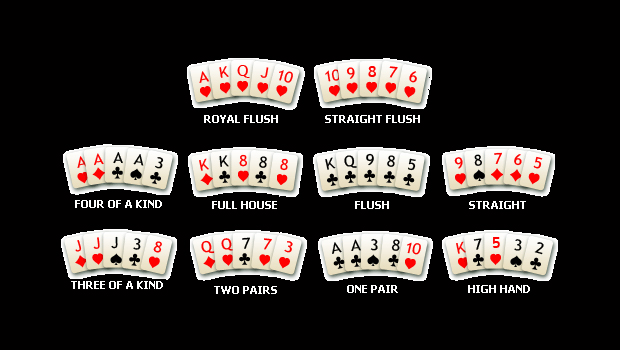
In the diverse world of card games, poker stands out due to its unique blend of skill, luck, and psychology. It’s a game that not only tests your ability to strategize and bluff, but also your understanding of the game’s underlying mathematical principles. A fundamental element of poker is the ‘hand’ – the combination of cards a player holds at any given moment. Understanding the types of poker hands, their relative strengths, and probabilities of being dealt each type is crucial for mastering the game. In this comprehensive guide, we will explore the types of poker hands, their hierarchies, and some related FAQs.
1. High Card
The simplest form of poker hand, a high card hand, is one where no other better hand combinations exist. This hand’s value is determined by the highest card it holds. For example, if your highest card is a King and no one else at the table can form any other hand, you win. However, this is the lowest possible hand in poker and the likelihood of winning with it is relatively slim.
2. Pair
A step above a high card hand is a pair, which, as the name suggests, consists of two cards of the same rank and three unrelated cards. The pair could be anything from a pair of twos (deuces) to a pair of aces (pocket aces). When two players have pairs, the pair of higher rank wins. If both players have an equal pair, then the highest of the remaining three cards determines the winner.
3. Two Pair
A two-pair hand consists of two different pairs and one unrelated card. The player with the highest pair wins if both players have two pairs. If the highest pairs are equal, the second pair or the unrelated ‘kicker’ card determines the winner.
4. Three of a Kind
Also known as ‘trips’ or a ‘set,’ this hand features three cards of the same rank and two unrelated cards. If two players both have a three-of-a-kind, the higher ranked trio wins. If both trios are of the same rank, the higher kicker determines the winner.
5. Straight
A straight consists of five consecutive cards of any suit. The highest card determines the value of the straight, with the Ace being the highest or lowest card in the sequence. However, a sequence like Q-K-A-2-3 is not considered a straight.
6. Flush
A flush is a hand where all five cards are of the same suit but not in any particular sequence. If two players have a flush, the one with the highest ranked card wins. If the highest cards are equal, then the second, third, fourth, or fifth highest cards are compared in order.
7. Full House
This hand consists of a three-of-a-kind and a pair. The rank of the three cards determines the winner if two players have a full house. If the trios are equal, the pair’s rank comes into play.
8. Four of a Kind
Also known as ‘quads,’ this hand consists of four cards of the same rank and one unrelated card. If two players have a four-of-a-kind, the one with the higher ranking quartet wins.
9. Straight Flush
A straight flush is a rare and powerful hand that consists of five cards in sequence, all of the same suit. The player with the highest ranking card in their straight flush wins if two players have a straight flush.
10. Royal Flush
The royal flush is the highest and rarest hand in poker. It consists of the Ace, King, Queen, Jack, and Ten, all of the same suit. It’s a straight flush of the highest possible cards and cannot be beaten by any other hand.
Conclusion
Understanding the different types of poker hands is key to developing a solid poker strategy. Not only does it allow you to assess your own hand’s strength, but it also lets you estimate the potential hands of your opponents. Although the probability of receiving higher-ranking hands is low, the excitement lies in skillfully using whatever hand you’re dealt with, trying to outsmart your opponents, and walking away as the victor.
FAQs
Q: What is the most common type of poker hand?
A: The most common poker hand is a high card hand, followed by a pair.
Q: What are the odds of getting a royal flush?
A: The odds of being dealt a royal flush are approximately 649,740 to 1 in a 52-card deck.
Q: How is a tie resolved in poker?
A: In the event of a tie, the player with the highest ‘kicker’ card wins. If the tie persists, the pot is split among the tied players.
Q: Can the suit of the card affect the hand’s rank?
A: In most poker games, all suits are equal, and they don’t influence the rank of the hand. The suit only comes into play in a flush, straight flush, or royal flush.
Q: What is the best starting hand in Texas Hold’em Poker?
A: In Texas Hold’em, the best starting hand is a pair of aces, also known as pocket aces.
January 27, 2025
January 27, 2025
January 27, 2025
January 27, 2025
January 27, 2025
January 27, 2025
January 27, 2025
January 27, 2025
January 27, 2025
January 27, 2025